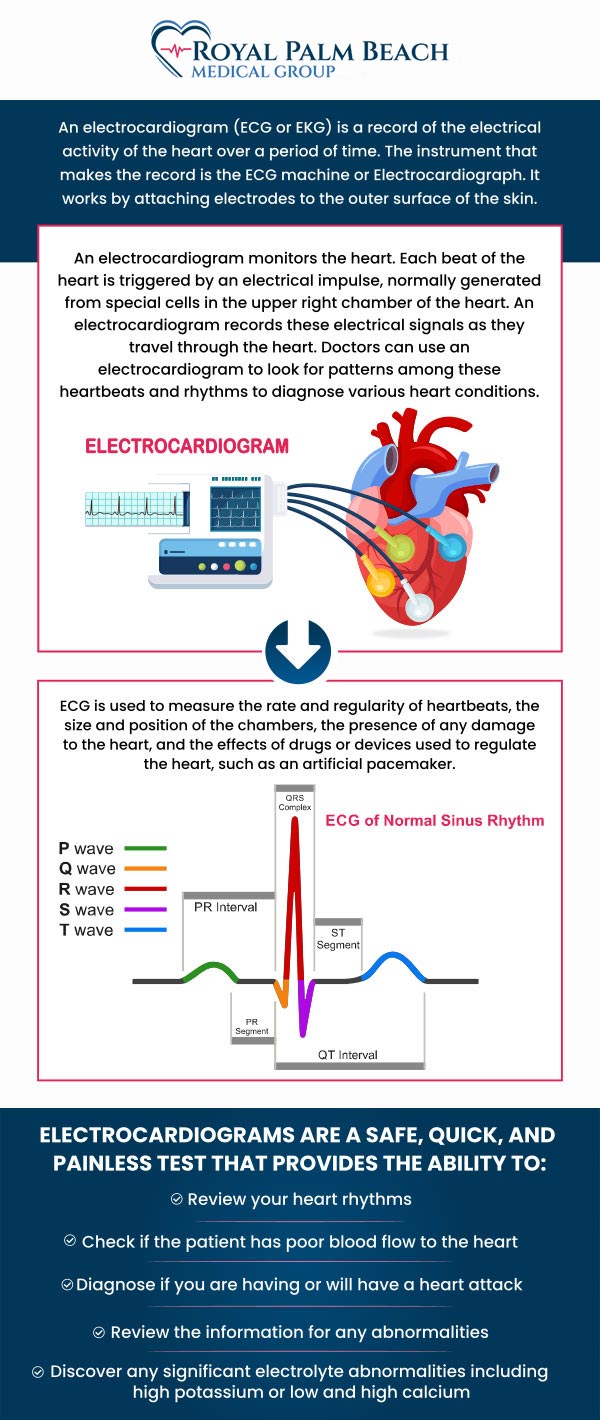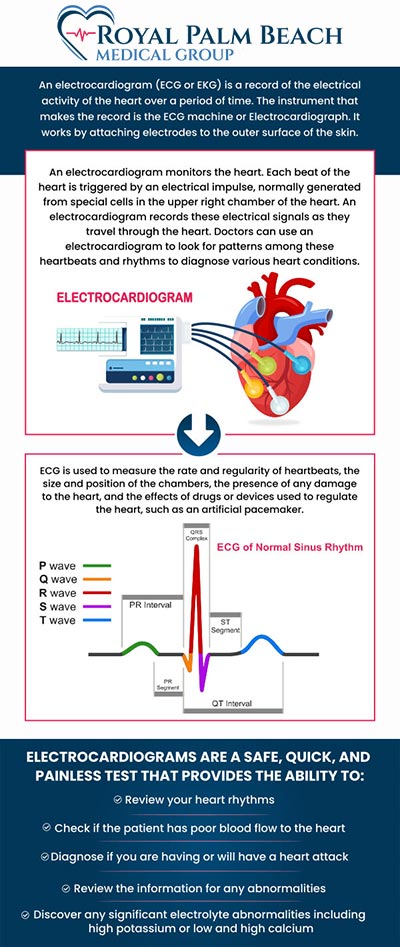EKG Specialist in Fort Lauderdale and Royal Palm Beach, FL
EKG services provide accurate and efficient heart health assessments to detect irregularities and monitor cardiovascular conditions. At Royal Palm Beach Medical Group, our specialists offer professional and personalized EKG testing to ensure timely diagnosis and care for your heart health needs. For more information, contact us or schedule an online appointment. We are conveniently located at Fort Lauderdale and Royal Palm Beach, FL.




Table of Contents:
What is an EKG done for?
How long does an EKG take?
What disorders can an EKG detect?
What are the signs of a bad EKG?
Our experienced healthcare professionals use EKGs to detect abnormal heart rhythms, known as arrhythmias, which may indicate underlying cardiac problems. The test is also vital for diagnosing conditions such as heart attacks, congestive heart failure, coronary artery disease, and inflammatory conditions like pericarditis and myocarditis.
If you experience symptoms such as chest pain, shortness of breath, dizziness, or palpitations, an EKG can help determine whether these are related to heart disease. The test can provide insights into past heart attacks or highlight areas of the heart not receiving enough oxygen, enabling timely intervention and treatment.
Furthermore, we use EKGs to monitor the effectiveness of treatments for heart conditions. Whether you’re on medications or using devices like pacemakers and defibrillators, our team will ensure your treatment plan is optimal for your heart’s health. For individuals with a family history of heart disease or risk factors such as high blood pressure, diabetes, or smoking, an EKG can be part of a routine examination to catch potential issues early.
By offering a detailed overview of your heart’s electrical activity, EKGs are a fundamental component in the early detection and management of cardiovascular conditions. Our commitment is to provide you with the highest quality care for maintaining and understanding your heart health.
Our experienced medical staff ensure that the entire EKG procedure, from preparation to completion, is efficient and comfortable. Typically, the process takes about 5 to 10 minutes, with electrodes being gently placed on your chest, arms, and legs. These electrodes connect to an EKG machine, which records your heart’s electrical signals and generates a detailed electrocardiogram for analysis.
During the procedure, you’ll be asked to lie still on an examination table to ensure the accuracy of your readings. The actual recording takes only a few seconds and once finished, the electrodes are removed, allowing you to continue with your day without any downtime. We recommend allowing approximately 15-20 minutes for the entire visit, including check-in and discussions with our medical team.
The results of your EKG are a crucial component of your cardiac health assessment. Our skilled physicians will interpret the findings in conjunction with other important information, such as your medical history and any additional tests you may need, to provide a comprehensive diagnosis and personalized treatment plan.
We are committed to delivering exceptional cardiac care and ensuring your heart health is in expert hands. If you have any concerns or need further information about the EKG process or any other services we offer, please don’t hesitate to reach out to our dedicated team.
Our state-of-the-art EKG technology allows us to detect arrhythmias, such as atrial fibrillation and ventricular tachycardia, which can manifest as palpitations or chest discomfort. Identifying these irregular heart rhythms is crucial to prevent complications and tailor treatment to each patient’s needs.
We also utilize EKGs to diagnose conduction abnormalities, including heart block and bundle branch block. These conditions can disrupt the heart’s electrical pathways, and our expert team is equipped to interpret EKG results for timely interventions.
For patients at risk of coronary artery disease, EKG capabilities are instrumental in detecting signs of reduced blood flow to the heart, such as ST-segment changes. In cases of myocardial infarction, rapid EKG assessments allow us to initiate immediate treatment, minimizing heart muscle damage and enhancing recovery prospects.
We also employ EKGs to diagnose cardiomyopathies, with our skilled clinicians identifying distinct patterns associated with dilated, hypertrophic, and restrictive forms. Furthermore, our EKG services can detect pericarditis and electrolyte imbalances, providing critical information for comprehensive cardiac evaluations.
Our commitment to advanced cardiac diagnostics ensures that each patient receives the highest standard of care. Through the use of EKGs, we strive to deliver precise diagnoses and effective management of heart health, guiding our patients toward optimal wellness.
At Royal Palm Beach Medical Group, we prioritize your heart health with advanced diagnostic tools, including electrocardiograms (EKGs or ECGs), to assess the electrical activity of your heart. Our skilled healthcare professionals are adept at identifying and interpreting signs of abnormal EKGs, which is crucial for diagnosing various cardiac conditions and ensuring timely intervention.
An EKG is vigilant in detecting irregular heart rhythms, known as arrhythmias, which are key indicators of cardiac issues:
● Tachycardia: We monitor for rapid heartbeats exceeding 100 beats per minute, which can signal underlying health concerns.
● Bradycardia: Slow heartbeats below 60 beats per minute are carefully evaluated to determine potential causes.
● Arrhythmia: Irregular heart rhythms are assessed to identify any abnormalities in heart function.
Our experts analyze wave patterns for any unusual features such as:
● Ventricular Hypertrophy: Enlarged ventricles are identified through specific wave changes.
● Atrial Fibrillation: We track irregular heartbeats originating from the heart’s upper chambers to manage this common condition.
● Heart Block: Delays or blockages in electrical impulses are diagnosed to ensure proper treatment.
ST segment analysis helps us identify critical markers of heart health:
● ST-segment Elevation/Depression: These changes can indicate ischemia or heart muscle damage, prompting immediate action.
● T-wave Inversion: We assess for signs of heart muscle damage or electrolyte imbalances.
Comprehensive EKG evaluations also include:
● Prolonged QT Intervals: These are closely monitored as they can increase the risk of dangerous arrhythmias.
● Prolonged QRS Complex: This can indicate delays in electrical conduction, requiring further investigation.
● Abnormal P Waves and Axis Deviations: These can point to impulse generation issues or ventricular hypertrophy.
● Bundle Branch Blocks and Low Voltage Complexes: Our specialists are trained to detect these abnormalities, which may suggest pericardial effusion or other conditions.
Understanding that each patient’s heart is unique, Royal Palm Beach Medical Group provide personalized EKG analysis in the context of your overall health. Our healthcare professionals are always available to discuss your EKG results and recommend appropriate treatment options if any abnormalities are detected. Trust us to be your partner in maintaining a healthy heart.
For more information, contact us or get an online appointment. We are conveniently located at Fort Lauderdale and Royal Palm Beach, FL. We also serve patients from Fort Lauderdale, FL, North Lauderdale FL, Pompano Beach FL, Plantation FL, Royal Beach FL, Wellington FL, Westlake FL, Golden Lakes FL, and surrounding areas.

Additional Services You May Need






